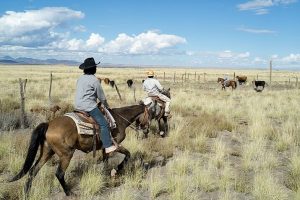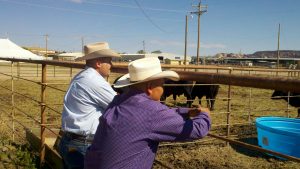Located on the Navajo Nation, Window Rock lies within the St. Michael’s Chapter, adjacent to the Arizona/New Mexico state line. The community, which sits at an elevation of 6,830 feet, is approximately 160 miles west of Albuquerque.
Activities
With nearly 40 percent of households living below the poverty line, and 33 percent of the population being younger than 18, the Navajo people face numerous challenges. Among these are drought conditions and invasive species that are affecting the quality of their traditional homelands, limiting opportunities for economic activities and undermining efforts to redevelop local food systems. Through long-standing relationships with educational institutions, tribal government and community organizations, the Window Rock extension program is assisting Navajo farmers, ranchers and tribal youth in becoming successful producers while restoring and preserving their heritage and natural resources.

Highlights
MEASURING IMPACT
-
“What I have seen with the FRTEP program is their willingness to come out and bring the programming to the reservation… [not] what we can and cannot do, but what they can provide.”
-
“Because of the high poverty level [on the reservation], there’s a lot of lateral violence amongst our people, and … the 4-H community is something I’ve come to greatly appreciate because there’s a lot of camaraderie and friendships built amongst the parents and kids. And that is a community I really want my son to be raised in.”
FRTEP programs have had a major impact on individuals, families and tribal communities. Just how much impact has now been quantified thanks to a research project that used Ripple Effects Mapping (REM) and content analysis. The Indian Land Tenure Foundation (ILTF) engaged in a joint collaboration with an evaluation team and the Western Extension Risk Management Education Center to measure the long-term impacts of the Federally Recognized Tribal Extension Program (FRTEP) serving the Window Rock. Click the link below to read the report.
FRTEP extension programming
In all extension programming at Window Rock, the primary goal for agents is to support a holistic approach that addresses community concerns by connecting the health of the land, its animals and the Navajo economy with the health of the people, their families and traditional Navajo lifeways. Extension delivers outreach and technical assistance to Navajo people of all ages, facilitating access to educational programs that promote youth mentoring, workforce and economic development and culturally appropriate agricultural practices related to soil, water and energy conservation.
Rangeland management tools
Extension delivers workshops on new Navajo Nation-specific mobile rangeland management tools developed by Extension, tribal elders, technical experts and others. These workshops promote best practices in land and range management, animal husbandry and other aspects of animal production.
Cultural adaptation
Extension agents work with Navajo elders and technical experts to make adaptations to educational materials to ensure they are culturally appropriate and place-based to increase relevance for communities that are both diverse and geographically widespread. In doing so they support and advance efforts to create resilient Navajo communities through conservation education and economic/workforce development that preserves traditional Navajo ways of life. This includes promoting best practices in home and community gardens, rainwater harvesting and small business/entrepreneurship.
Farmer and rancher productivity and management workshops are held to help improve beef quality practices. Agents use video teaching as well as hands-on demonstrations. Improvements that have resulted from these workshops include the use of proper injection sites, vaccine care, marketing and good record keeping practices.
Farm-to-school
The University of Arizona’s FRTEP extension program at Window Rock supports farm-to-school efforts that are intended to help integrate locally grown and traditional Navajo foods into school cafeterias and classrooms. Agents are working with tribal elders to explore connections between traditional farming methods and conventional approaches so that culturally appropriate good practices can be identified.
4-H Youth Development
Participation has continued to grow. 4-H leaders hosted 10 youth camps ranging from indoor projects to large animal showmanship clinics, reaching more than 200 youth and adults as a result. Building projects have been conducted to improve safety for young participants.
COVID-19 Activities
- Distributed latex gloves and face masks to local Navajo chapter houses.
- Assisted Shiprock community farmers in selling their upcoming produce harvests amid COVID-19 curfew conditions and concerns.
- Provided regular COVID-19 healthcare news, information, updates and impacts on the Navajo Nation.
- Worked in conjunction with the Navajo Nation Shiprock tribal extension staff to plan a virtual livestock show and sale in lieu of the cancellation of the Navajo Nation Fair Junior Livestock Show.

Contact Information
Leander Thomas – Extension Educator
Phone Number
928-241-4139
leanderthomas@arizona.edu